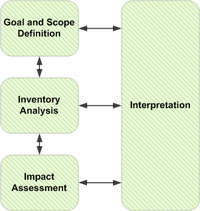
Photo from wikipedia
Abstract Photovoltaic (PV) power system is a technology for producing electricity from renewable resources that is rapidly expanding thanks to its capability to save conventional fossil fuels and to decrease… Click to show full abstract
Abstract Photovoltaic (PV) power system is a technology for producing electricity from renewable resources that is rapidly expanding thanks to its capability to save conventional fossil fuels and to decrease the emissions of greenhouse gases. However, as more attention is being focused globally on the development of building-integrated PV systems, the technical, the economic as well as the environmental assessment of these systems is crucial to ascertain their viability. The purpose of this paper is to present an economic and environmental analysis of relatively small rooftop PV-grid-interconnected energy systems of 2–10 kWp rated power, located in Athens, Greece. The techno-economic feasibility of the PV systems is conducted employing the computerized renewable energy technologies assessment tool ‘RETScreen’. The energy and environmental assessment of the systems is carried out employing SimaPro 7.1 software, which is a standard Life Cycle Assessment tool. The results of the economic analysis indicate that with the current prices, investment in PV-grid-interconnected systems with power capacity higher than 5 kWp is in general viable. However, an increase in energy sale prices and/or cost reductions in the production of PV systems are crucial for the successful development of small-scale residential size PV systems in the country. The environmental analysis reveals that the PV systems with higher rated power perform worse as far as the environmental impact is concerned. The critical phase of the life cycle of PV systems is the module manufacturing process, which is characterized by high electricity consumption, representing most of the environmental impact. Nevertheless, it is further shown that the application of PV technology presents important environmental benefits compared to conventional energy production systems.
Journal Title: Energy and Buildings
Year Published: 2017
Link to full text (if available)
Share on Social Media: Sign Up to like & get
recommendations!